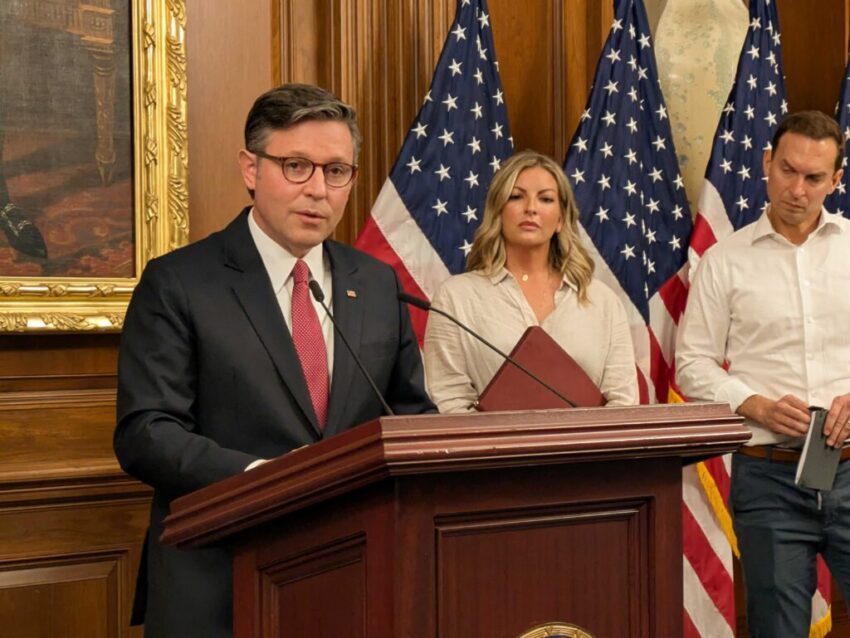House Speaker Mike Johnson of Louisiana speaks to reporters about the Republican budget reconciliation package at a weekly press conference on Tuesday, June 24, 2025, at the U.S. Capitol. (Photo by Ashley Murray/States Newsroom)
Congress on Thursday afternoon passed the sweeping spending package dubbed the “one big beautiful bill,” marking a major legislative win for President Donald Trump — but clean energy advocates say it could derail future renewable projects.
The House approved the measure after the Senate significantly revised the original proposal. For a moment, the renewable energy industry was stunned by provisions that included a proposed tax on solar and wind power, along with an accelerated phase out of Biden-era tax credits.
Although the final version of the bill dropped the proposed tax, it also eliminated the electric vehicle tax credit established under the 2022 Inflation Reduction Act. It further shortened the window for renewable energy projects to qualify for solar and wind credits. Under the new rules, eligible projects must begin construction within a year of the bill’s passage and be placed in service by the end of 2027.
“I was proud to vote for the Inflation Reduction Act to help position Virginia as a leader in clean energy technology, putting us on a path toward 20,000 new jobs and lower energy costs,” Sen. Tim Kaine, D-Va., said in a statement.
“…Why would President Trump and congressional Republicans undo such historic and effective legislation, and go even further to hurt clean energy by imposing new requirements many wind and solar projects won’t be able to meet?”
The tighter deadlines have raised alarms for projects still in the approval pipeline across several states. Appalachian Voices, an environmental advocacy group, said the bill could jeopardize local and community-led initiatives.
“If you start that project and you have an unexpected delay, but you’re still relying on the credits to get through the end of financing, then you’re just put in a really bad position,” said Kevin Zedack, government affairs specialist for Appalachian Voices. “Especially if you have that project currently moving, and already understand that it’s not going to be placed in service by the deadlines that were imposed. Then you’re just maybe a community organization or a church just left holding the bag.”
Zedack said the tax credits don’t just benefit large scale solar and wind farms for utilities, emphasizing that there have been a number of small community solar projects that were boosted by the credit.
For example, Lee County Public Schools implemented 1.4 megawatt panels across seven schools, along with job training programs. Appalachian Voices reports the school district saved over $3 million over the lifetime of the project.
Sen. Mark Warner, D-Va., stated he is deeply disappointed by the roll backs of renewable energy incentives in the bill, especially after Virginia has made significant strides under the Virginia Clean Economy Act.
The fossil fuel industry, however, came out ahead in the bill. In the final Senate version, metallurgical mines are eligible for a 2.5% tax credit for production. While Virginia has steadily reduced coal production in recent years, there are still more than 100 active mines, mostly in the southwestern part of the state.
“A lot of most of the metallurgical coal that is produced in the United States comes from Appalachia, and most of that product is exported to other countries like India and China to produce cheaper steel,” Zedack said.
The bill passed the house with a margin of 218-214 with all Democrats and two Republicans voting against the measure. The measure now heads to the president’s desk for his signature — ahead of the July 4 deadline imposed by Trump.
GET THE MORNING HEADLINES.
Click this link for the original source of this article.
Author: Shannon Heckt
This content is courtesy of, and owned and copyrighted by, https://www.virginiamercury.com and its author. This content is made available by use of the public RSS feed offered by the host site and is used for educational purposes only. If you are the author or represent the host site and would like this content removed now and in the future, please contact USSANews.com using the email address in the Contact page found in the website menu.








